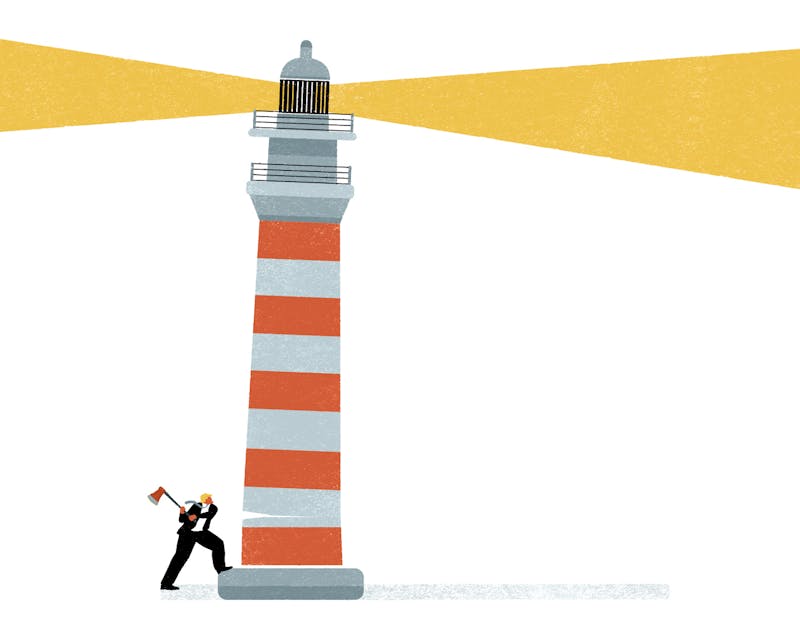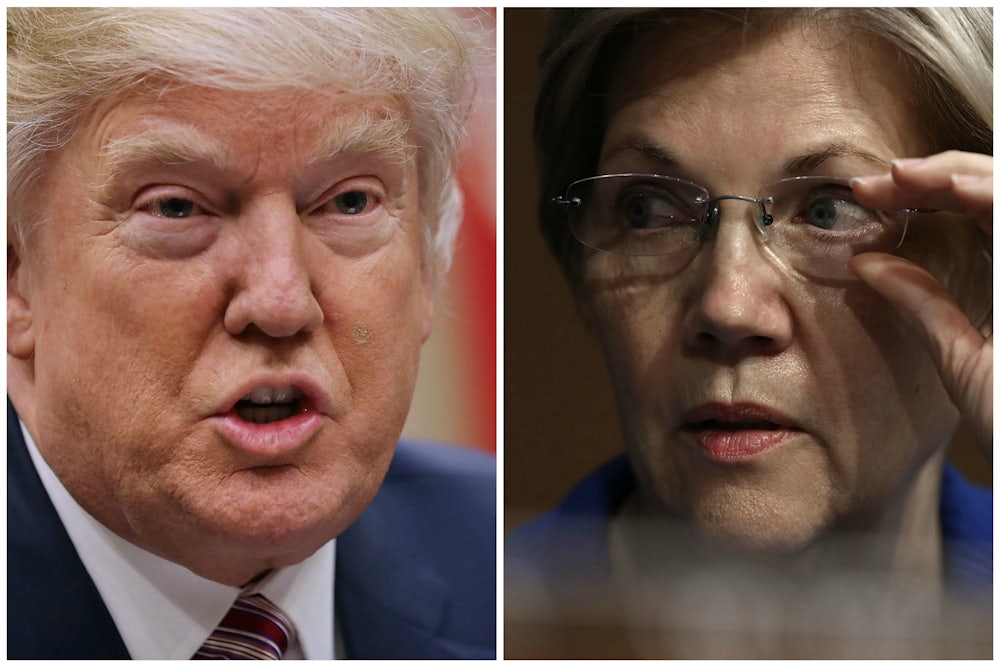In his second week in office, Donald Trump huddled at the White House with a group of leading Wall Street executives. Their goal: to unravel Dodd-Frank, the law passed in the wake of the global financial crisis to curb some of Wall Street’s most predatory practices. In front of assembled press, Trump pointed to Jamie Dimon, the CEO of JPMorgan Chase, which had been forced by the Justice Department to pay a record $13 billion in 2013 for misleading investors about toxic securities. “There’s nobody better to tell me about Dodd-Frank than Jamie,” Trump declared. “We expect to be cutting a lot out of Dodd-Frank.”
That afternoon, Trump signed a pair of executive orders that pave the way for rolling back many of Dodd-Frank’s financial reforms. It was not just a gift to “friends of mine,” as the president put it—people, he said, with “nice businesses.” It was also the opening salvo in a full-fledged war to destroy the law’s most high-profile and effective creation: the Consumer Financial Protection Bureau.
It’s no surprise that a Republican president with close ties to Wall Street would target the CFPB. The watchdog has been a lightning rod for Republican outrage ever since Elizabeth Warren first proposed the idea as a professor at Harvard Law School. As soon as the agency was created, Republican lawmakers began trying to curtail its power or eliminate it outright. GOP ads depict the agency as a neo-Stalinist ministry that is the natural enemy of American consumers. “The CFPB supposedly exists to protect you,” House Speaker Paul Ryan tweeted after the agency levied a $100 million fine against Wells Fargo for incentivizing widespread fraud against borrowers. “But instead it tries to micromanage your everyday life.”
As a self-styled defender of the little guy, Trump should actually be working to strengthen the CFPB, not dismantle it. During his campaign, Trump railed against the global financial elite who had enriched themselves at the expense of ordinary Americans. The working class was devastated by the deep-seated corruption that caused the financial crisis, and Trump’s electoral strongholds are high-density zones of home foreclosures, subprime loans, and payday lenders—exactly the sort of predatory schemes the CFPB was designed to police.
“The CFPB is the first federal agency to look out for Americans on these issues,” says Lisa Gilbert, who monitors Congress for the consumer watchdog group Public Citizen. “As the part of Dodd-Frank that people engage with every day, its work has been massive and essential.”
Consider the CFPB’s track record. In less than seven years, the agency has successfully prosecuted more than 100 financial institutions—often refusing settlements, taking wrongdoers to court, and placing the worst offenders under ongoing supervision. It launches many investigations by following public complaints posted on its web site, which serves as a model for government transparency. “Unlike other agencies, the CFPB’s complaint system is public and searchable,” says Alexis Goldstein, a senior analyst with Americans for Financial Reform. “It’s become a great resource for anyone getting ripped off.” Thirteen million Americans have used the CFPB’s education and training programs, and the agency routinely helps consumers force lenders to reduce or erase fees and overcharges. All told, the agency has chalked up nearly $12 billion in civil fines and consumer refunds for 29 million Americans defrauded by scams. It has returned another $8 billion to consumers by reducing predatory loans, or canceling them outright.

In addition, no agency has done more than the CFPB to defend the rights of military veterans—those whom Trump extolled on the campaign trail as the archetypal “forgotten Americans,” discarded and betrayed by elites loyal to Wall Street over Main Street. According to the Consumer Federation of America, the CFPB has returned $120 million to military families cheated by illegal foreclosures, predatory lending, and crooked loan schemes. It has visited 145 military bases across the country to inform soldiers of their rights, and in January it filed a lawsuit against Navient, the country’s largest servicer of student loans, for intentionally ruining the credit ratings of combat veterans suffering from “total and permanent disability.” In 2014, the agency won a $60 million settlement against Navient for systematically charging illegal interest on the accounts of 78,000 active-duty military personnel—a practice the Justice Department described as “intentional, willful, and taken in disregard for the rights of service members.”
It’s plain to see why the Wall Street interests aligned behind Trump would want to shut down or weaken the CFPB. But that may be easier said than done. As an independent agency within the Federal Reserve, the CFPB is off-limits to congressional budget cutting and White House interference. Its director, Richard Cordray, is currently serving a five-year term that runs until July 2018, and can only be fired for “inefficiency, neglect of duty, or malfeasance in office.”
With Trump in the White House, however, Republicans are already gunning for the CFPB. “It’s time to fire King Richard,” Senator Ben Sasse of Nebraska declared in January. A few weeks later, Representative Jeb Hensarling of Texas, the chairman of the House Financial Services Committee, took to the pages of The Wall Street Journal to call for Cordray’s head. “The CFPB is arguably the most powerful, least accountable agency in U.S. history,” Hensarling wrote. A leaked memo drafted by Hensarling reveals the Republican plan in detail: The CFPB’s rulemaking authority and enforcement powers would be sharply curtailed, and its consumer education initiatives would be eliminated. The director, meanwhile, could be fired “at will” by the president—turning the agency into a lapdog rather than a watchdog.
If Republicans move forward with their assault, however, Democrats may finally find themselves in a battle they have a good shot at winning. According to Americans for Financial Reform, 59 percent of Republicans—including a majority of Trump voters—want to see the CFPB expanded, not undermined. If he were true to his word, Trump would listen to the voters who placed him in office, not Jamie Dimon.
“The CFPB is popular across the political spectrum because it has consistently delivered for consumers,” Elizabeth Warren tells the New Republic. “If President Trump or congressional Republicans try to gut the agency to please payday lenders, debt collectors, and big banks, Democrats will stand on the side of working families and fight back tooth and nail.”
